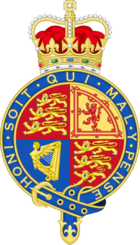Public Order Act (Northern Ireland) 1951 facts for kids

|
|
| Long title | An Act to make certain provision with respect to the maintenance of public order and the prevention of disturbance of public meetings, and for purposes connected with the matters aforesaid. |
|---|---|
| Citation | 1951 c. 19 |
| Dates | |
| Commencement | Immediate |
| Other legislation | |
| Amended by | 1970 |
| Relates to | Public Meeting Act 1908, Civil Authorities (Special Powers) Act (Northern Ireland) 1922, Flags and Emblems (Display) Act (Northern Ireland) 1954; Public Order (Northern Ireland) Order 1987 |
|
Status: Repealed
|
|
The Public Order Act (Northern Ireland) 1951 was a law passed by the Parliament of Northern Ireland. This Act was created to help keep public order and prevent problems at public gatherings and parades. It mainly focused on how meetings and parades that weren't "traditional" should be managed. Later, in 1970, the law was updated to cover more situations, including groups that used violence and carrying weapons.
Contents
Rules for Public Gatherings
This law had several important rules about public gatherings and processions.
Giving Notice for Parades
The first rule said that anyone planning a public parade had to tell a senior officer of the Royal Ulster Constabulary (RUC) at least 48 hours beforehand. This was to give the police time to prepare.
There were a few exceptions to this rule. Funeral processions did not need notice. Also, "public processions which are customarily held along a particular route" were exempt. This meant parades that had happened for a long time on the same route did not need notice. If someone failed to give notice, it was against the law.
Changing Parade Routes
A senior RUC officer could order a parade's route to be changed. This would happen if they believed the original route might lead to a breakdown of public order or serious trouble.
Banning Parades
Sometimes, changing a route wasn't enough to prevent serious disorder. In such cases, the Minister of Home Affairs could issue an order. This order could ban any or all parades in a specific area to keep the peace.
What Was Against the Law
The Act also made certain actions illegal during public meetings or parades:
- Saying or doing anything insulting, threatening, or abusive.
- Displaying anything that might cause trouble or disorder.
- Acting in a disorderly way to stop a lawful public meeting from happening.
If someone was found guilty of breaking these rules, they could face penalties. Depending on the specific offence, they could be fined up to £500 or sent to prison for up to two years.
Changes to the Act in 1970
The Public Order Act was updated in 1970. This happened because of the start of the Troubles, a period of conflict in Northern Ireland.
New Rules and Offences
The 1970 update added several new rules:
- It became illegal to knowingly take part in a parade or meeting that was against the law.
- The notice period for parades was increased from 48 hours to 72 hours.
- It became illegal to try to stop, block, or annoy a legal parade.
- It was made illegal to sit, kneel, or lie down in a public place to block any lawful activity.
When the RUC considered changing a parade's route, they now had to think about "the desirability of not interfering with a public procession customarily held along a particular route." This meant they should try not to change routes for traditional parades if possible.
Increased Penalties and Bans
The maximum fines and prison terms for less serious offences under the Act were increased. The amendment also brought in new bans:
- It banned wearing uniforms that showed membership in a political group or support for a political goal. The Minister of Home Affairs could make exceptions.
- It specifically banned the formation of groups that used violence for political aims.
- It banned carrying offensive weapons in public places.
When the Act Ended
The Public Order Act (Northern Ireland) 1951 was eventually replaced. It was repealed, or cancelled, by the Public Order (Northern Ireland) Order 1987. This new law was an order in council made by the British government. This happened during a time called direct rule, when the British government directly governed Northern Ireland.
The new 1987 law removed the special rule for "traditional processions." It also required all parade organizers to give seven days' notice to the RUC, instead of 72 hours.
How the Act Affected Northern Ireland
The 1951 Act took over the control of parades in Northern Ireland from an older law, the 1922 Special Powers Act.
Even though "customary" parades were never officially defined, many people believed this part of the law favored Orange Order and other Protestant/loyalist marches. Under the older Special Powers Act, these parades were usually allowed to go wherever they wanted. However, parades by Catholic and republican groups were often limited to areas where most people were Catholic.
Before the Troubles began, it was very rare for loyalist parades to be banned. If a Minister did ban one, it often caused big problems for their career. Once the Troubles started, the Act was used to ban all parades in Northern Ireland for several periods between 1969 and 1972. While loyalist parades were still rarely banned completely, it became much more common for their routes to be changed.
See also
- Public Order Act
 | Claudette Colvin |
 | Myrlie Evers-Williams |
 | Alberta Odell Jones |

